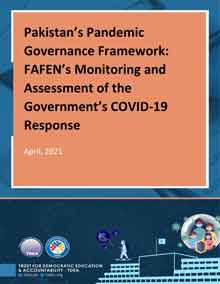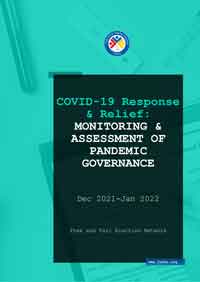- Releases Sixth Report on Monitoring and Assessment of the Government’s COVID-19 Response
ISLAMABAD, May 2, 2021: Free and Fair Election Network (FAFEN) has stressed upon short-term strategic approach to cover the gaps, especially in setting up a structural platform that establishes close coordination at various tiers of government, a robust legislative engagement, and oversight that imparts an inclusive and representative character to all measures needed and, lastly to build public knowledge and understanding that makes compliance with safety guidelines more voluntary than enforced.
FAFEN’s monitoring and observation of governance of COVID-19 response from October 10, 2020, to April 14, 2021, also indicates an indifferent attitude of the concerned authorities towards legal, institutional, and implementation issues that impact Pakistan’s capacity to respond to pandemics and other health emergencies. It also paints a worrying picture of the country’s overall health governance system.
Even though the country is undergoing the third wave of the COVID-19 pandemic, the legislature, which is the first pillar of the governance system, has largely ignored the pandemic and the issues undermining the healthcare system. A minimal interest had been observed in the pandemic in the country’s legislative bodies, with only a few giving the importance COVID-19 needed as a national health emergency.
Second, the institutional framework required to deal with a pandemic under a national response is missing. Even though health is a provincial subject post-18th constitutional amendment, all three waves of COVID-19 illustrated that the devolution is far from being complete while the required national-level coordination had to be established through ad-hoc measures.
Media, being an important pillar of governance and oversight systems, has not been either ready, or prudent to observe, report, and comment on the state of health governance in Pakistan. National, and local level media monitored at district levels, and interviews with journalists at district level shows that these stakeholders lacked the capacity of evidence-based reporting. Now with its focus towards operationalization of response, the role of Pakistani media has started improving gradually since the start of the pandemic as it began using evidence-based reporting and demanding the executive and the legislature to behave more responsibly in face of the third wave of the deadly virus.
The aggravating pandemic situation in Pakistan comes in the wake of persisting governance gaps that threaten to derail the gains made in the first wave of the pandemic. Throughout the second wave and the beginning of the third wave, continued vigilance and oversight of the pandemic by the executive and the legislatures took a backseat to the ongoing political wrangling that displaced the pandemic from the government’s priority. More consequentially, the environment fostered a lack of compliance among the citizens with what appeared as a return to the country’s normal political discourse.
Despite warnings from various stakeholders including medics and civil society organizations such as FAFEN, the government announced ease in restrictions on February 24, 2021. Around the same time, the trends were showing an increase in infections and positivity rate. Hardly a week had passed when the government backtracked from its decision and announced the onset of yet another wave with the re-imposition of several restrictions. The third wave had found its foothold by then.
The test-positivity ratio then reflected a steep increase, changing from 3.4 percent in February to 7.7 percent in March and accelerating further to 9.8 percent by the end of the second week of April. The mortality rate, on the other hand, declined from 3.4 percent in February to 1.8 percent in March. However, the absolute number of deaths went up, and 1,592 casualties in March 2021 were the second-highest since October last year.
Beyond positivity ratios and mortality rates, trends in other critical indicators in the third wave paints a more worrying picture than at any other time since the first COVID-19 case was recorded in February 2020. The total number of new infections experienced a dramatic change from February to March 2021. A total of 90,403 patients were added to the health system. More worrying is the unabated acceleration in new infections as more than 60 thousand positive cases were recorded in the first two weeks of April alone.
Due to inconsistencies in the system, there has been a general lack of trust in the government’s COVID-19 response among the public. A consistent reading of lack of compliance with SOPs through all the waves of the pandemic even at public offices and health facilities is a clear example of the trend. A more recent expression of lack of trust in the government’s decision-making regarding the pandemic is the lowest number of vaccinations against COVID-19 in Pakistan when compared to the neighboring countries. This again is an expression of the fact that when the system of governance is reactive, lacks transparency, and is inconsistent in its decisions like implementation of lockdown, its credibility suffers a significant and perhaps irreparable loss.
To download the report, click here



